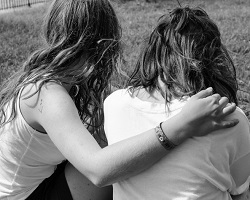Bulgaria launches new national programme amid pandemic on violence against women and children

WHO/Malin Bring
Bulgaria has adopted a national programme to prevent and protect women and children against domestic violence. The programme meets a crucial need as nongovernmental organizations (NGOs) have registered an increase in violence against women and children since the beginning of the COVID-19 pandemic.
One of the main challenges in preventing violence has been the lack of a coordinating body, bringing together both government and civil society.
Better coordination among all institutions, reviewing specific cases of violence and looking at the best ways to deal with them are all part of the programme’s remit.
Surge in domestic violence during COVID-19
In Bulgaria, WHO works closely with government institutions and with women’s support organizations, such as the NGO Animus, which runs helplines for women and children, as well as protective shelters for victims of abuse.
“In Bulgaria, 7 women have lost their lives at the hands of a partner or family member since COVID-19 confinement measures were set in place. The national helpline for children, that offers information, counselling and help to children over the phone, received 80 reports of a parent abusing another parent in March alone, according to the Minister of Internal Affairs. This indicates that violence against women and children has doubled compared to the months before the pandemic,” says Dr Michail Okoliyski from the WHO Country Office in the capital Sofia.
WHO and Animus are currently running a joint advocacy and awareness-raising campaign to promote the importance of maintaining services for women and child victims of violence during the COVID-19 crisis and the state of emergency that is set to continue until 13 May.
Violence remains underreported
In 2016, Bulgaria adopted the Equality between Women and Men Act and has also amended its criminal code to include stalking, psychological violence and some elements of coercive control.
However, rape within marriage is not explicitly criminalized in the revised version of the criminal code, and Bulgaria has one of the lowest reporting rates of violence against women and children in the European Union.
Around 70–80% of cases pass under the radar, according to the Center for the Study of Democracy estimates for 2015. In the case of Roma women, the rate of non-reporting is as high as 90% due to fear and lack of family or institutional support. WHO is currently reviewing the estimates of intimate partner violence in Bulgaria and in all WHO Member States.
WHO has published guidance for policy-makers and national health systems on actions that can be taken to address violence against women during the COVID-19 response, produced a set of Q&As on violence against women during the pandemic, and developed an information sheet together with UN Women on the collection of data on violence against women and girls during COVID-19.



